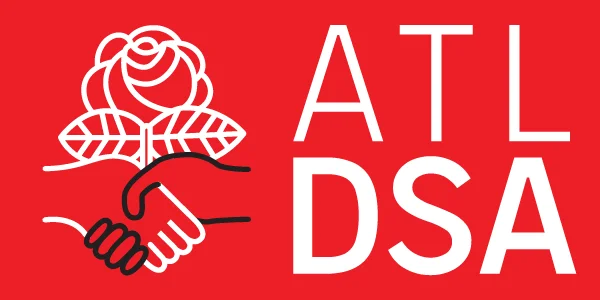

ACAB, Especially Eric Adams
Election day was Tuesday and DSA’s 30+ nationally-endorsed campaigns were put to voters. With a nearly 70% win rate for DSA's campaigns nationally, there's much to discuss about organizing for socialism at the ballot box and the rising tensions between the left and the existing Democratic establishment. On tonight’s show, we'll share provisional election results and an interview with a DSA-endorsed candidate for Somerville, Massachusetts City Council, Tessa Bridge.
Here in NYC, Eric Adams has -- unfortunately -- swept to victory as mayor. Adams has publicly distanced himself from the left and socialism, so to extend the courtesy, let us just say that *all* cops are bastards. How are we going to beat Adams and the bourgeois, capitalist interests he represents? We discuss that question live with our comrade Robert Cuffy, a union city worker and police abolitionist who organizes with NYC-DSA's Labor Branch and Afrosocialist Caucus.
We also hear a report from RPM's antifascist correspondent Amy Wilson on the rise of far-right organizing in New York City around the wedge issue of mandates for COVID-19 vaccine.
Keep up with the results of DSA's nationally-endorsed races as they develop, thanks to our comrades at Metro DC DSA: https://washingtonsocialist.mdcdsa.org/station-z/dsa-races-2021


Close the Comanche 3 Coal Plant
The Comanche 3 Coal Plant is the largest single source of air pollution in Colorado. It’s a massive generating station southeast of Pueblo where you can see the smoke from miles away. To avert the worst of the climate crisis we need to shut it down as soon as possible.
A Bad Idea from the Beginning
One of the tragedies of the Comanche Coal Plant is that it was built in 2010. We were already experiencing record-breaking heat waves and other extreme weather events from climate change. It was clear then that building new coal plants was a death sentence.
Yet, Xcel Energy pushed for the project and the Public Utility Commission (PUC), responsible for regulating Xcel, gave the project the green light.
The project cost nearly a $1 billion to build. Since it came on line, not only has the electricity been dirty, but it has struggled to even work. Break downs have cost hundreds of millions of dollars to fix. It’s one of the most expensive, unreliable sources of energy in our state.
It’s criminal that Xcel built this coal plant and that the PUC allowed the project to go through.
Glaring Example of Environmental Racism
The Comanche Coal Plant sits near the heavily working class and Latino city of Pueblo. One out of every ten adults has chronic obstructive pulmonary disease, more than twice the state average. As is so often the case, frontline communities endure the worst harms of running coal while Wall Street investors reap the profits.
Join the Fight to Close the Comanche Coal Plant
Originally Xcel planned on running the coal plant until 2070. After public outcry and determined organizing, that date was pushed back to 2050, then again to 2040 and now finally 2035. However, the science is clear that coal needs to wind down by 2030.
Xcel just proposed its ten year plan to the Public Utility Commission (PUC). The PUC is responsible for listening to public comments and deciding what the final plan will be.
Hundreds of people have already submitted comments telling the PUC to close all coal plants, especially Comanche 3, by 2030.
Luckily, the PUC has new commissioners from the one that approved construction of the plant in the first place. We have a good chance of convincing them to do the right thing, but we need to show an outpouring of support for closing the coal plant to make that happen.
Three ways to help Close the Comanche Coal Plant
- Write a comment demanding that the Comanche 3 Coal Plant close.
- Join our DSA Climate Comment & Watch Party on December 2nd
- Email ecosocialist.committee@denverdsa.org to join us in building power for a Just Transition


Solidarity Has To Be Experienced To Be Believed


Strategic Escalation with Zohran Mamdani
As regular listeners of Revolutions per Minute know, we are living in a time of many overlapping campaigns for justice for the working-class. Sometimes, organizing campaigns result in victory and opportunities for celebration while looking toward the next goal. Other times, campaigns require strategic escalation. On tonight’s show, we’ll speak to New York for Abortion Rights about a key victory in the struggle to protect access to abortion for all. We’ll hear from NYC-DSA member and Assemblymember from District 36 in Astoria Zohran Mamdani on the New York Taxi Workers Alliance sit-in at City Hall and why he’s going on hunger strike alongside taxi workers to demand debt forgiveness.
Finally, we travel to Little Rock, Arkansas, with Malik, a former NYC-DSA organizer, who is using lessons learned from NYC to build socialism in his hometown.
Follow New York for Abortion Rights at abortionrights.nyc.
Follow Assemblymember Zohran Mamdani at @ZohranKMamdani and learn more about the New York Taxi Workers Alliance sit-in at @NYTWA.
Follow Central Arkansas DSA at @CentralARKDSA.


November 30th, 2021 Runoff Voter Guide
Thank you for using our 2021 municipal voter guide for the Nov. 30th runoff elections! This guide was written by the Atlanta DSA Electoral Committee and is limited in scope to address the Atlanta elections for Mayor and City Council. Authors approached writing this guide with socialist values and a progressive, pragmatic lens. We see this as an opportunity to share information with fellow Atlanta DSA members, Atlanta voters, and other community members about the central questions shaping Atlanta politics.
Key issues that resurface throughout this voter guide include the vote to clear-cut the South Atlanta forest and build an 85-acre, $90 million Cop City, the long-running campaign to close the Atlanta City Detention Center (ACDC), and grassroots efforts to defund the Atlanta Police Department, including the Rayshard Brooks Bill and the vote on the FY22 police budget. Where applicable, we assess the candidates based on their stances and votes on these topics. (Special thanks to Mainline Zine for their thorough coverage of these issues!)
Atlanta DSA’s membership votes on endorsements, and we only campaign for endorsed candidates. However, many people already plan on voting and want guidance from a socialist perspective. Where we can, we provide assessments of candidates and identify those we believe are likely to cause the least harm. These assessments come from Atlanta DSA’s Electoral Committee, not the entire Atlanta DSA chapter.
Read the Full Guide Here:
Read our original November 2 2021 Voter Guide here.
Updated November 18, 2021


Vote Red Wave By October 15th [Podcast Exclusive!]


A New Deal for CUNY: A Collective Demonstration of Union Power


SA DSA Stands in Solidarity with Musicians of the San Antonio Symphony
On Sunday, Musicians of the San Antonio Symphony voted unanimously to strike after the San Antonio Symphony Society announced a proposal it described as their, “last, best, and final offer.” The Board and Management’s unwillingness to bargain in good faith with the musicians that create the symphony’s vibrant sound is abhorrent; especially after Symphony musicians voluntarily accepted an 80% salary reduction, all while taking on additional labor such as producing virtual content.
The courage shown by members of the American Federation of Musicians, Local 23 is an inspiration to all workers. Throughout the pandemic, we’ve seen workers across San Antonio take the fall for management’s failures. From the service industry being rushed back into work in unsafe conditions, to the looming CPS rate hike, it is the working class of San Antonio that is always asked to pay. Meanwhile the wealthy insulate themselves from any overhead at the expense of worker labor. The Musicians of the San Antonio Symphony took a pay cut due to the pandemic, but not one member of senior management took a pay cut during the same time period.
We, the members of San Antonio DSA, stand in solidarity with AFM Local 23 and encourage our membership to join the harmonious sounds of a strike on the picket line! We urge the public to avoid any Symphony performances until a new and just contract is bargained. More ways to support the workers while on strike are forthcoming.
As socialists, we believe the cause of labor is the hope of the world and we look forward to welcoming the Musicians of the San Antonio Symphony back after a fair contract is won.


Fighting the Good Fight for Housing Justice with Alexa Avilés
On Friday rent will be due for millions of New Yorkers. For tenants struggling to pay rent, this summer has been a roller coaster of ups and downs as hard fought for eviction moratoriums at the state and federal level have been won, overturned and finally reinstated here in New York, providing crucial protections until Jan 15, 2022. Today we will talk with NYC-DSA endorsed candidate and democratic nominee for City Council District 38 Alexa Avilés about why she was arrested earlier this summer fighting for housing justice, what caused New York City's housing crisis in the first place, and what her housing priorities are once she becomes a member of city council next year.
For more info follow the Housing Justice for All campaign @housing4allNY on Twitter and Alexa Avilés @alexaforcouncil


"Pro Life"? That's a Lie!
"Because of my access to birth control and abortion, I was able to have my first child last year when my husband and I were financially stable enough, emotionally ready and could be the best parents we could be for him. Family planning is a human right for all birthing bodies and after experiencing childbirth I am an even stronger advocate for everyone’s right to an abortion, on demand for any reason they decide to," writes tonight's host Desiree Joy Frias.
For too long, anti-abortion forces have claimed the label of “pro-life” while passing laws and encouraging actions that cause direct harm to people’s lives and bodies. As the right-wing assault on abortion access in the United States continues to escalate, organizers in New York City are fighting back and standing up for politics that center bodily autonomy, human rights, and reproductive freedom. Hear from New York City for Abortion Rights on the local struggle to protect abortion clinics and ensure access to abortion by any means necessary.
Plus, we visit the New York Taxi Workers Alliance sit-in at City Hall to discuss another life-or-death issue: medallion debt forgiveness. Taxi workers are demanding that New York City provide adequate debt relief for drivers as soon as possible.
Follow NYC4AR on their website abortionrights.nyc or on Instagram at https://www.instagram.com/nycforabortionrights/. Visit https://linktr.ee/nycforabortion to sign the petition to stop clinic harassment in Cobble Hill or donate to an abortion fund in Texas. The next Cobble Hill counter-protest will be held on October 9.
The NYC-DSA Debt & Finance Working Group is calling on DSA members and allies to show up in solidarity with New York taxi workers this Friday, September 24. Learn more and RSVP at bit.ly/DSAforNYTWA.